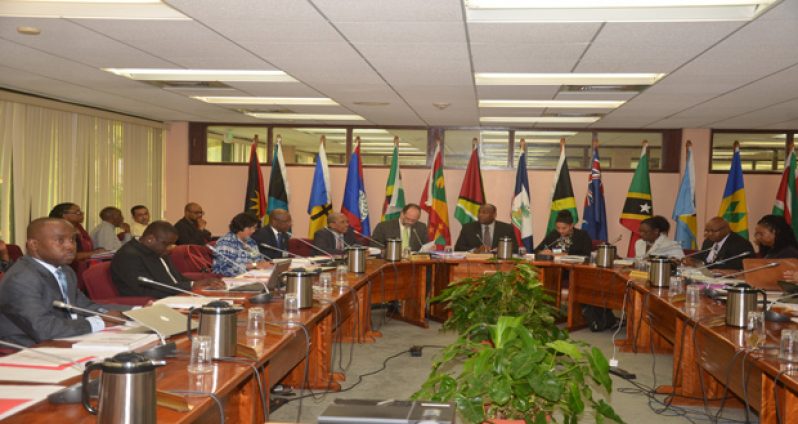YOUNG people are assets ready to be used, Caricom Youth Ambassador of Belize, Tarun Butcher said, as she addressed the 29th Meeting of the Council for Human and Social Development (COHSOD) Thursday.CARICOM Secretary-General Irwin LaRocque; Assistant Secretary General, Human and Social Development at the CARICOM Secretariat, Dr. Douglas Slater; Minister within the Ministry of Education, Nicolette Henry; and St. Lucia Minister of Youth Development and Sports, Shawn Edward, were among the dignitaries present during Butcher’s address for the opening ceremony of the two-day forum.

Constantly, youth are reminded that they are the future leaders and key to the development and sustainability of the Region, but Butcher made it clear that the young generation had been forging ahead despite many challenges.
“Caribbean youth have long contributed to social, political and even economical change in not only our Region but in the world,” she posited.
Butcher added: “Despite the challenges that young people face, the limited resources that we have, and for some of us in the Region the lack of support from these institutions, we continue to charge forward and contribute to the development of our Region.”
The Caricom Youth Ambassador said while the young generation had the elements needed to contribute to societal change, technological innovation and the development of the Region as a whole, they continue to battle with the issues of poverty, social inequalities and marginalisation.
“Poverty, social inequalities and marginalisation are just some of them [issues] that are corrosive to the impact that we can have on our communities, on our countries, the Region and the world,” Butcher said.
Though acknowledging that the youth governance structures and programmes were being strengthened within the realm of CARICOM, she said those questions must be asked: “Have you [CARICOMleaders] really done your part? Have you incorporated your young leaders at the discussion table?”
It is time, she said, that a larger percentage of young people be active participants at the decision-making table and not just invited to meetings as a matter of courtesy. According to her, stronger relationships are needed.
“The youth want to participate now, if not now, then when? If not us the youth, then who? “The survival and development of our young people are directly related to the survival and development and the sustainability of our Region,” the Youth Ambassador said.
“We are one million strong,” she added, while reminding the Caribbean leaders that youth must be seen as valuable assets and not problems to be solved.
In his address, Ambassador LaRocque said the scourge of crime and violence was a crippling burden that many of the member states and associate members were grappling with, noting that it has seriously compromised citizens’ security and robbed society of the energy and potential of youth, in particular, who are both victims and perpetrators.
“The social, psychological and economic cost is too high, although we know that it is a minority of our youth who are falling victims to a line of crime. It is an important minority that we need to address urgently,” the Secretary-General emphasised.
Alluding to COHSOD’s theme: “Leveraging CARICOM’s Human and Cultural Assets for the Sustainable Development of the Community,” Ambassador LaRocque said it speaks pointedly to the tremendous opportunity the Region has in both developing the Region’s youth and cultural assets.
He recalled that the Heads of Government, during the 26th Inter-Sessional Meeting in the Bahamas in 2015, reflected on the theme, during which it was observed that the strategy that combines the cultural and sporting assets of the Region’s innovative, youthful human resource and with new technologies will open up opportunities for new and sustainable development pathways.
It was pointed out that the development of that youthful human resource would engage the attention of CARICOM as it conducted a five-year review of the report of the CARICOM Commission on Youth Development and the Declaration of Paramaribo on the future of youth in the Caribbean Community.
“These seminal documents were both considered by Heads of Government in 2010 and represented a watershed moment in youth development in our Region. It is an appropriate moment for reflection and assessment of our progress and to redouble our efforts to address the challenges to the full implementation of those important recommendations,” the Ambassador said.




.png)









